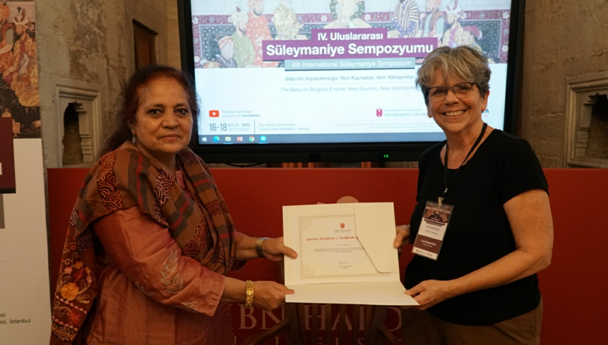AMU historian presents paper in Istanbul
Aligarh: Prof Gulfishan Khan, Chairperson, Centre of Advanced Study, Department of History retold the glorious life in Mughal India in a rich-in-detail research paper on ‘Padshahnama (Book of the Emperor): Mughal Emperor Shah Jahan and Mumtaz Maḥal’ that was presented in the three-day ‘4th International Suleymaniye Symposium’ held from September 16 to 18 on the theme ‘The Baburid (Mughal) Empire: New Sources, New Approaches’ at the Department of History, Ibn Khaldun University, Istanbul, Turkey.
She discussed the family life of Emperor Shah Jahan and his beloved wife, Arjumand Bano Begum, the Empress Mumtaz Maḥal also known as Nawab Mahd Ulya Mumtazzamani.
“Shah Jahan, unlike his father, wrote no autobiographical memoirs. Nonetheless, the official history of his reign written in prose and verse provides a view of the complex family relationships within the Mughal household”, said Prof Gulfishan.
She spoke about the famous chronogram of Queen Mumtaz Maḥal’s death composed by the court poet Bebadal Khan that inspired the magnificent tomb.
“It reads, when Mumtaz Maḥal departed from this world, the Houris opened the gates of Paradise for her and the angels said: May the abode of Mumtaz Maḥal be Paradise”, said Prof Gulfishan as illustrations of rare paintings from the British Library, London) and the Fine Arts Museum, Harvard were displayed through a projector.
Talking of India’s cultural relations with the Ottomans during the Mughal period, she pointed out that no less than three formal diplomatic embassies (1637-38, 1650, and 1653), from Istanbul at the Mughal court at Agra and later at Delhi were received.
“But these cultural exchanges were particularly focused on the imperialistic agenda of Mughals in the region for gaining control over Kabul and Qandhar (modern day Afghanistan) and materializing their claims over their Central Asian homeland in Uzbekistan”, said Prof Gulfishan.
She called for future research on the multifaceted history of the Mughal Empire and other kingdoms such as the Safavids of Iran, the Chingizid Khanate of Central Asia and the Ottomans of Asia Minor.
“A connected meaningful historical narrative, conveying the idea that the course of history can be comprehended and interpreted can be written”, stressed Prof Gulfishan.
She informed: “More than 30 papers on the Mughals were presented by scholars from South Asia, Europe, North America and Turkey in different sessions of the symposium. The programme also had paper presentations on Sanskrit texts translated into Persian during the times of Mughal emperor Akbar and Prince Dara Shikoh”.

